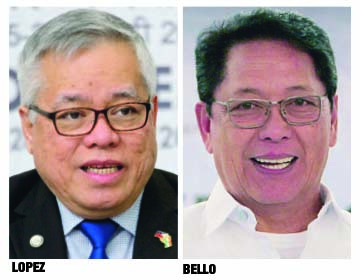
Four cabinet members, Presidential Legal Counsel Sal Panelo, Finance Secretary Carlos Dominguez, Trade and Industry Secretary Ramon Lopez, and Labor Secretary Silvestro Bello, reacted to my May 13 column, “Now, it’s modified”, in which I said “the strictest lockdown in Asia has produced the worst wrong results.”
I also wrote:
“Since household expenditure is 68% of the economy, the economy will remain dead because consumers still cannot go out to spend their ayuda or savings. And outlets for such spending are closed – restaurants, shops, and malls. The 68% is equivalent to P33.53 billion per day of spending or P2 trillion in 60 days.
“On the other hand, the government is 11.6% of the economy. But it has run out of cash, so it won’t be able to spend much. The 11.6% is equivalent to P5.7 billion per day or P343 billion for 60 days. You have 68 plus 11.6: A good 80% (which produces P1.4 trillion of spending per month) of the economy is still crippled. This makes ECQ, whether modified or classic, senseless and utterly useless. For what? Just to save, at most, 500 lives.”
In his thrice-a-week PTV4 talk show, Counterpoint, Sal, a good friend from way back, defended President Duterte saying he cares for lives, to justify locking down the economy at great cost. Those lives include mine, Sal said.
To buttress his argument against my column, Sal asked Dominguez, Lopez and Bello to react to my column. The presidential legal adviser read their letters on air.

Here is Sonny Dominguez: “The earliest validated reports of COVID-19 transmission within the Philippines provided incontrovertible evidence that an outbreak could be imminent. President Duterte and the Philippine government responded with urgency and resolve to save lives and protect our communities, imposing one of the earliest and strictest lockdowns in the region. Based on estimates from our development partners, such as the World Bank, acting swiftly has saved thousands from death and even more from infection.
“The numbers are simple and clear. Our strict lockdown measures have succeeded in flattening the increase of COVID-19 cases. From a high of more than 500 cases detected in a single day in late March, we are now detecting between 200 to 300 daily, despite massively increasing our testing capacity since then. As a result, our treatment centers have not been overwhelmed like in other countries. In fact, the latest figures from the Department of Health, as reported by the hospitals themselves, show that we still have more than 60% of our isolation and treatment capacity ready and available for severe cases. This is a much better outcome than the shortages in mechanical ventilators and ICU beds that we have seen elsewhere in the world.
“The Duterte administration’s public investments in health care are now augmented by additional funding from historic and successive adjustments to sin taxes on tobacco, alcohol, and e-cigarettes, measures that also help prevent non-communicable diseases. We are finally addressing some longstanding weaknesses of the public health care sector for the medium- to long-term. In terms of our urgent and immediate needs, we have saved thousands of lives and kept the health care system from being overwhelmed, despite our health care system’s limitations.
“The move to improve tracing does not mean we have not taken steps to test and trace patients. It only means we are committed to doing better. We will intensify our surveillance of cases and their contact history, even more crucial as we modify of our community quarantine regime. What expanded contact tracing, isolation of cases, and strict social distancing achieve in combination is the protection of individuals and communities by mitigating the risk of possible waves of infection. Until a vaccine is discovered and widely distributed, global health experts suggest that we may see periodic increases in infection, and the worst case scenarios will become reality in our country if we do not manage the situation responsibly and effectively.
“To insinuate that lockdowns are merely an attempt to consolidate power is speculative, irresponsible, and misguided, at best. The government would not have recommended risk-based downward adjustments in quarantine levels to eventually move to a “new normal” if it wanted to keep a tight grip on people’s lives. On the contrary, we want people to live their lives as normally as minimum health standards will allow. But we make no apologies for taking the necessary steps to safeguard public health and safety. The imposition of the enhanced community quarantine was a necessary first step to beat COVID-19, and it was an ethical and moral decision that has saved thousands of Filipinos.”

“Loose analysis, not databased. Biased angle,” began DTI chief Ramon Lopez.
He said.
“Yes the economy is driven mostly by consumption (close to 70%), but recently, growth drivers have been government spending and investments esp on BBB.
The ayudas are certainly being spent already by the recepients on the basic essentials.
Supermarkets drugstores and food retails shops (deliveries take outs) have been open and in fact have shown strong growth as the lockdowns accelerated use of ecommerce and deliveries.
“False that consumption has not started. And it is now expected to go back to normalcy as we reopened almost all parts of the economy (around 85%) nationwide, with around 55-60% of economy at ECQ/ MECQ and the balance at MECQ.
“Government was able to serve its social amelioration program but has preserved its funds for the aggressive BBB program which has resumed under MECQ when we allowed construction.
False that there is no more fund for BBB
“MECQ is a calibrated reopening, to bring back more jobs, with managed risks as we require minimum health protocol standards.
“Moreover, BPOs and exporters have been open, to secure the fulfillment of their commitments to foreign buyers and clients.
“On his mention that we did ECQ to save 500 lives? It is an irresponsible statement.
“Premature opening of the economy has a trade off.
“More lives could have been lost if we kept it open or reopened earlier-with very low testing capacities and health facilities levels. We needed time also to build these health infrastructures. NO one was expecting this pandemic.
“Now, the rate of recovery have been more than rate of death.
“Lockdown definitely saved thousands of lives.”
Finally, Labor’s Silvestre Bello, another friend from his human rights days in Davao during the martial law years:
“There is no dispute that the lockdown has reduced the incidence of COVID-19 and number of resulting deaths.
“The delicate balance was between public health and economy.
“While employment of millions was put at risk due to the lockdown, there is no substitute to life and health.
“We can bounce back, restore economic activities and generate employment.
“Loss of life, unlike loss of employment, is irreplaceable.
“Based on the article, no specific issue naman po on employment.”
— Tony Lopez

